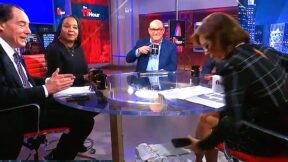MS Now Arrives With Renewed Purpose: Not a Rebrand, But a Reinvention

(MSNBC / Ralph Bavaro).
On Saturday, Nov. 15, MSNBC officially becomes MS Now — standing up a modern, independent newsroom under the new corporate banner Versant and formally separating from NBCU’s news division.
On Wednesday morning, President Rebecca Kutler hosted a breakfast-hour walk-through for roughly a dozen media reporters, with a rotating cast of on-air principals dropping in to shake hands and take questions. The mood could have been stage-managed cheer. It wasn’t. Nor was it self-reflection. It landed somewhere more useful: a candid accounting of a network in transition. Kutler didn’t hide behind slogans; she talked plainly about what’s working, what isn’t, and what needs rebuilding.
The timing — for once — cooperated. Just twelve hours earlier, Democrats had over-performed across key elections, a jolt of good news after a year of hard knocks. MSNBC also posted its best ratings night in a year. No one pretended that meant the winds had permanently shifted, but it gave Wednesday’s event an undeniable lift. After months of ambient drift, the place felt like it had caught a breeze.
This wasn’t a victory lap. It felt closer to a reset — a recalibration toward fact-based journalism and sharp, openly partisan analysis that doesn’t apologize for itself.
Inside the former New York Times building on West 43rd Street, MS Now has carved out a new newsroom that’s still technically temporary but doesn’t feel provisional. Three fresh studios sit side-by-side, engineered to work, not impress — soundproofed, clean, undeniably new. Control rooms and green rooms frame the new Versant offices, the corporate entity formed out of the MSNBC–Comcast split. The whole build has the hum of real investment. It looks like a stake in the ground.
This isn’t a name-plate swap. It’s an attempt to create a new operating culture built for the media economy as it exists now (or in he coming years), not the one executives spent the last decade trying to revive.
The need for that shift was earned honestly. The past year has been strange and, at times, dispiriting: ratings instability, uncertain political tailwinds, and a corporate separation that left even seasoned talent wondering what the next sentence would be. Bad quarters are survivable; uncertainty about purpose is not. On Wednesday, inside that new warren of glass and drywall, purpose finally felt articulated.
Kutler’s mandate isn’t to replicate MSNBC as it was, or disavow its DNA. The task is more surgical: keep what still resonates and stop letting bureaucracy veto good ideas. She talked about creative latitude, fewer layers, and quicker decisions — not as abstractions but as operating rules.
The physical space mirrors that. These aren’t show-floor sets; they’re factories — rooms designed to make things. At a moment when newsrooms are shrinking and production is treated like a liability, this build reads like a dare: if you give journalists room, will they surprise you?
To underline the stakes, the network’s most prominent names came through, fielding questions on the record.
Joe Scarborough — who has outlived every obituary written for cable news — boiled the assignment down to the only thing that still matters: content. Screens will multiply, platforms will fight, but audiences chase what they trust. Distribution matters; substance does more.
Mika Brzezinski layered in the cultural piece. Morning Joe works because experimentation isn’t an exception — it’s the format. Trial, error, reinvention. The hope is that MS Now will export that ethos: fewer reflexive no’s, more why-not.
Jen Psaki described the new operation as flatter and faster — a place where collaboration runs directly between talent and reporters rather than through a legacy procedural maze. Washington will always run on relationships, but the point here is to shorten the bridge, not add toll booths.
Psaki acknowledged that the period following the separation from NBCU felt wobbly, arriving just weeks after President Donald Trump won a second term. She compared the process to being the child in an amicable divorce — no betrayal, just a new arrangement and a recalibration of identity.
Michael Steele likened it to a coming-of-age story: not a breakup, but a logical progression. Anyone who knows the messy origin story of MSNBC can follow the narrative arc — the project has grown up and is now building on its own terms.
And crucially, location may matter less than the culture of the audience — a fiercely loyal base that treats the network as its own secular community. Call it MS Nation.
Reinvention isn’t a ribbon-cutting; it’s a discipline. But MS Now looks less like a stopgap and more like a bet — that in a fragmented media landscape, purpose still travels. Opinion journalism still has velocity. And if the work is sharp enough, people will find it.
The shiny new studios are impressive. But the deeper story is the architecture beneath them — the people, investment, and intent. That’s where the gamble lives. And if MS Now sticks the landing, that’s where the upside is too.
This is an opinion piece. The views expressed in this article are those of just the author.




